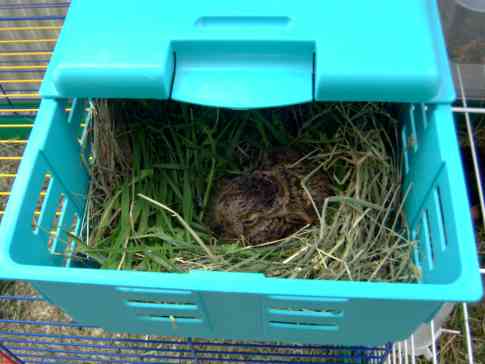|
|
Fostering a young hare
|
Why this site exists:
In April 2004 we accidentally found a young and injured hare (about three days old).
A dog had tracked down the hare and bitten it into its head. Bleeding at its skull and
the right eye, we brought the hare to our vet who was of the opinion, that it had a good
chance to survive. So we decided to try and raise the little one and to release it into
freedom once it was strong enough.
|
 |
Injured hare, about three days old.
|
The vet injected the hare an antibiotic to prevent an infection of its wounds, then we
drove home. There we had to face a lot of questions: what does a hare eat? Do we need
to warm it? How can we check its condition? How fast should it gain weight? This homepage
shall help you and the little hare if good advice is needed.
Unfortunately the hares' condition got worse at first. We gave it camomiletea to prevent it from
dehydrating. Through several other homepages on the Internet (Links) we learned, that a baby hare
needs to be fed with breeding milk for kittens, but since it was weekend we had to wait for the next
day to buy some. During the night the hares' condition worsened rapidly, it had spasms, wreathed himself
and screamed. In the morning we went to the vet again and he injected a remedy for traumas because the hare
obviously suffered from a cerebral concussion. The treatment seemed to work properly, the hare lay almost
motionless in its cage and could even take up some milk. From that day on the hare improved every day.
We kept the hare for seven weeks and during this time, we often marveled about the hares' strong will to
survive. At the age of eight weeks the wild animal shelter in Sachsenhagen released the hare into its natural
habitat. Hopefully it contributes to the preservation of its species because hares are rare nowadays.
From the beginning on we tried to avoid the hare to get used to us too much, but we learned that a baby hare
needs the contact to its (surrogate) mother. From our experience it is better to give it its share of kindness
and affection -especially when feeding- and to separate it from man at the age of about four weeks. As one
recognizes very fast, hares are most improper pets. They tend to be skittish and have a huge urge to move
around. No house or garden could ever be sufficient.
Hares need to be free!
If you foster a hare, please release it into freedom after eight weeks at the latest. Rabbits are far more
suitable if you like to keep a pet.
|
|
|
|